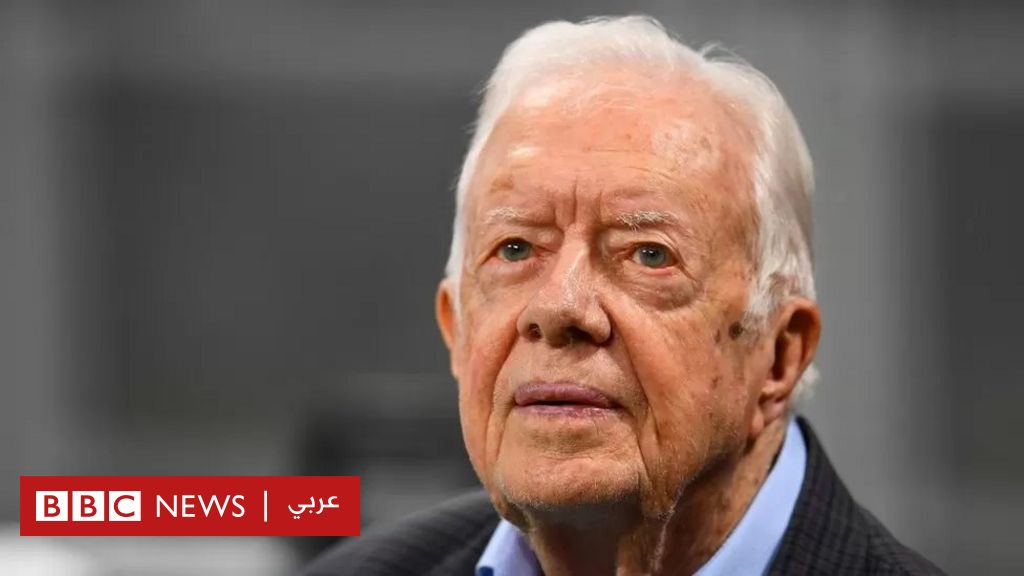- George Wright
- BBC News
Former US President Jimmy Carter has decided to stop receiving hospital care and move to his home in Georgia to receive end-of-life care.
The Carter Center said the former president preferred to spend “the rest of his life with his family,” but would not say what motivated the decision.
Carter, 98, suffers from health problems, including skin cancer. The cancer has also spread to the liver and brain.
The oldest living former US president served as president of the United States for one term, from 1977 to 1981.
During his tenure, the former president faced many foreign policy challenges. The Democrats were also defeated in the presidential re-election by Republican Ronald Reagan.
“He received the full support of his family and medical team,” the Carter Center said in a statement on the former president’s health.
Patients with irreversible conditions may start receiving end-of-life care instead of further treatment. In these cases, the priority is not to provide further treatment, but to provide comfort to patients as they approach the end of their lives.
Jason Carter, the grandson of the former US president and a former senator from Georgia, said in a tweet on his Twitter account: “I visited my grandmother and grandfather yesterday.”
He added that they “have peace and – as always – love in their home. Thank you all for your kind words.”
The couple, Jamie and Roslyn Carter, who have four children, celebrated their seventy-fifth wedding anniversary in 2021.
Jimmy Carter was born in 1924 in the state of Georgia and entered the world of politics in the sixties of the twentieth century when he was elected to the Senate from the state and then assumed the position of governor of the state in 1971.
Five years later, he won the US presidential election at the expense of former Republican US President Gerald Ford to become the thirty-ninth president of the United States.
However, the problems he faced soon accumulated upon assuming the American presidency.
On the internal level, the country witnessed an oil crisis that resulted in a rise in inflation and unemployment, which made President Carter suffer while trying to convince the Americans of austerity measures that had to be applied in order for the crisis to pass.
The most important event ever in Carter’s history as president of the United States was the signing of the Camp David Accords in 1978, in which Egypt officially recognized the State of Israel. He also signed an agreement that guaranteed Panama to regain control of the Panama Canal.
But in 1979, the last shah of Iran was overthrown and 66 Americans were taken hostage in Iran. Carter severed diplomatic relations with Iran in response to the overthrow of the Shah, and began a commercial boycott of Tehran.
However, the Americans saw that he was not strong enough, and his popularity began to decline, as the American hostages were held in Iran for 444 days. His ranking in the presidential election polls was also dealt a further blow after a failed attempt to rescue hostages from Iran resulted in the deaths of eight American soldiers.
Iran postponed the release of the hostages until Ronald Reagan took over the leadership of the United States, succeeding Carter.
Since leaving the White House, Carter has remained active in the country, working on humanitarian activities with the Carter Center.
He also led a delegation to persuade Haiti’s military leaders to hand over power in 1994 and brokered a cease-fire in Bosnia, which paved the way for a peace treaty in the region.
He also gained an international reputation for his work in advancing human rights, and was awarded the Nobel Prize in 2002.
Carter’s tenure was fraught with troubles, both at home and abroad
Together with Nelson Mandela, he founded The Elders, a group of international leaders dedicated to working for peace and human rights.
He also traveled extensively around the world until the early 1990s – participating in annual home-building trips with the humanitarian charity Habitat.
But the former US president has suffered from illness in the past years. In August 2015, Carter underwent surgery to remove a cancerous tumor from his liver.
The following year, he announced that he would no longer need any further treatment if an experimental treatment completely eradicated his cancer.
Carter has on many occasions shown surprising calm in dealing with the health challenges he faces.
In 2015, Carter said: “I feel very comfortable whatever happens to me. I have lived an exciting, adventurous and happy life.”
Carter celebrated his birthday last October in the small town of Plains in Georgia, where he and his wife were born between World War I and the Great Depression, and it is also the city they have returned to since he left office as president of the United States.
A large number of senior US politicians, most notably Senate Democratic Leader Chuck Schumer, New York State Governor Kathy Hochul and Senator Raphael Warnock, expressed their sympathy for Carter’s family with the news that his hospitalization had stopped on Saturday evening.
Warnock posted a tweet through his account on the social networking site Twitter, in which he said: “At such a sad time as he prepares to leave, I am sure that the Lord is with him. May he, Roslyn and the entire family feel comfort and peace as we surround them with our love and prayers.”


